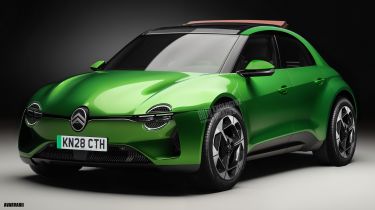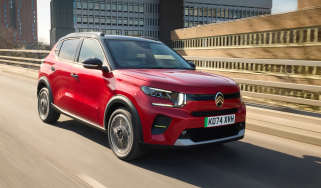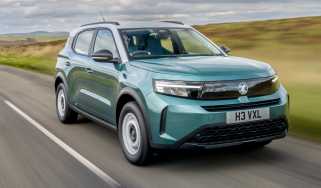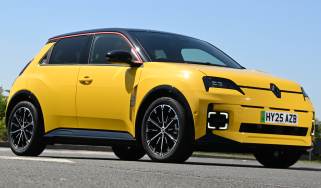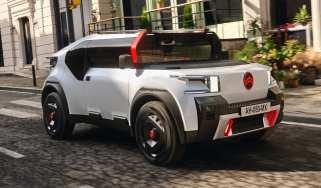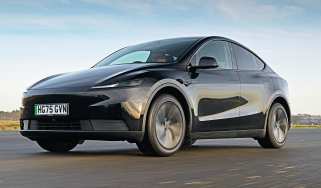New Citroen 2CV: plans for the icon's return, risks and rewards
We've spoken to Citroen bosses on their plans to reboot the 2CV and whether they should go retro or futuristic
Citroen is considering whether to bring back the 2CV, the 1940s masterpiece of simplicity that put Europe back on the road after World War II.
The recreation of the Renault 5 supermini and Renault 4 hatchback (reinterpreted as an SUV) has got French brand's executives questioning whether to delve into their brand’s back catalogue and revive the iconic Citroen 2CV. It’s one of the biggest decisions facing new CEO Xavier Chardon – and Auto Express has exclusively spoken to his predecessor Thierry Koskas and head of design Pierre Leclercq to get their views.
Reviving the Citroen 2CV – a cheap four-seat car with a long canvas roof, a tiny engine to save fuel and comfortable suspension so it could carry a basket of eggs across a ploughed field – is the subject of intense debate inside Citroen’s Paris HQ. And we’ve waded into the debate by having our illustrator dream up two new takes on the 2CV, one retro, one modern. You can see the two exclusive images on this page.
Why bring back the Citroen 2CV?
Citroen’s discussions centre on whether that concept of ‘four wheels and an umbrella’ – set out in the late 1930s – is still highly relevant to car buyers pampered by digital touchscreens, aspiring to premium, assailed by electrification and drowning in choice? And how transferable is the original design to a car that would come out 90 years after its progenitor?
“We have a very, very strong heritage, one of the richest in the car industry,” then-Citroen boss Koskas told us. “We have the 2CV, the Traction Avant, the DS: amazing cars known all over the world. I absolutely agree that one of the big strengths of European brands is their heritage.
“On the product side, we are not taking it as a general direction to do retro design. But I do not exclude that maybe we study and [have] some exploration, we are open to look at that. But at Citroen you will not see all the future cars reminding you of previous models.”
Steeped in his brand’s history, the Citroen leader for more than two years is well aware of the 2CV’s philosophy, arguing “something super simple that takes you from A to B, with the necessary room – these ideas can feed us in a great way, because it's very much the DNA of the brand.” But will Citroen go beyond philosophy and recreate the 2CV’s look?
“You will have people that value a design that is close to a car they used to love in the past. This is the debate,” explains Koskas. “But there have been successes and failures in [automotive] revivals. Some fail because [companies] don’t position the car properly, they seem retro but aren’t really, or customers don’t really like the car or recognise their love story. So if we were to do it, we would have to be very, very careful and cautious about how we did it.”
The challenge of bringing back the Citroen 2CV poses more problems than Renault faced with the 5. Its chic supermini concept, launched in 1972 and lasting until 1996, remains deeply relevant and its form is still recognisably contemporary – unlike the 2CV’s.
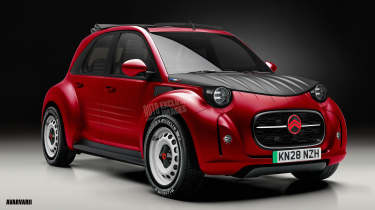
Up front, those articulated fenders are distinctively pre-World War II, grafted onto a relatively thin, long nose that followed the form of the inline flat-twin engine. It’s a form that makes no sense today – especially if the new Citroen 2CV is electric with no engine to package – and would have to meet crash regulations and place round headlamps at the car’s extremities.
And slavishly following that horseshoe cockpit’s silhouette could mean some difficult trade-offs between occupant and boot space: one reason why VW’s 1990s Beetle failed was compromised practicality, particularly rear headroom.
Big alloy wheels are critical to muscular modern car design so could Citroen return to the 2CV’s faired-in rear wheels? We asked the brand’s design director Pierre Leclercq, who pointed out historic cars’ narrow tracks and inboard wheels (“great car but look at an E-type’s!” he urged) are a far cry from contemporary precisely stuffed arches.
“We have them as flush as possible in today's cars and that’s much better. It's super important because this gives a stance on the road,” Leclercq told us. “Let's say we have to do CX or a GS again, we’d have to make a piece of plastic [over the rear wheel] with an offset of maybe 50mm to do [it].”
And what’s head of design Leclercq’s take on the retro design trend?
“[Customers like it for] reassurance. I'd like to go back to the past for some projects, it's interesting,” he explained. “They've done a great job with the Renault 5. Do we want to do it – and as much as they do? It's a good question: why not? Why yes? There's nothing planned, really. But we don't forbid ourselves to try.”
Given the Citroen 2CV’s design is so of its time and would need dragging into a new millennium, do the risks outweigh the rewards?
“It's a very difficult exercise,” concedes Leclercq. “You could do a 2CV, you could do an H-type, a CX, we could easily bring back cars from the past. But obviously, the first one coming to everyone’s mind is the 2CV, asking ‘when do you bring it back?’ Mmmm. Let's see.”
There’s no doubt a team as creative as Leclercq and his designers will have sketches and probably scale models of a reborn Citroen 2CV. Renault’s future 5 had already been designed and rejected by a previous management team before the current CEO Luca de Meo arrived in 2020 and green-lit the proposal.
But the critical question is whether a new 2CV is retro or a reimagining? Citroen’s product planners will be trying to estimate demand for different approaches: could a concept car be a way to test the water, we asked Koskas?
“It could be this is what we want to do,” replied the then-CEO. “The C5 Aircross concept was a show car, which means you are very close to the series model: it’s a good marketing strategy. But our next concept car will show ideas, clues, intentions, directions that will inspire the future cars, but probably means you’ll never see a Citroen car like that on the road. As we did with the Citroen Oli concept in 2022.”
New Citroen 2CV platform
There are many more considerations than the design. Does Citroen have the budget, design and engineering capacity, or does it need to shelve other projects to accommodate a 2CV? Where would the production car be built? And which car platform and drivetrains would it use?
The original Citroen 2CV measured 3.82-metres long and stood 1.6m tall, thanks to its jacked-up height for tackling rough terrain. The new C3 hatch isn’t much longer, measuring 4m and 1.57m. That suggests the C3’s front-wheel-drive ‘smart car’ platform could provide a usable base, especially given its clever engineering would help keep costs low, as per the 2CV philosophy.
The Stellantis Group underpinnings unlock a choice of pure electric or three-cylinder hybrid petrol power, which would be mounted transversely and drive the front wheels, like the original car. The extra cylinder and packaging a modern car’s ancillaries and crash structure would make matching the Citroen 2CV’s nose impossible.
So could Citroen find inspiration in the reborn Renault 4, a hatchback originally launched in 1961 to steal 2CV customers with its extra speed and sophistication? Although it was “not a very nice-looking car,” according to Renault Group design director Laurens van den Acker, who was tasked with updating it.
What his team has done so effectively is take a few design cues – the rearmost trapezoidal glass panel, tail-light motif, low-set boot and the graphic of the second-generation’s grille – and turn them into a cute SUV. It’s a stretch, literally: the reborn 4 is almost 50cm longer than the sixties hatch. But the original 4’s two-box shape lends itself to an SUV.
Could Citroen do the same and reinvent the 2CV as an SUV? Maybe. But at that point is it actually a 2CV at all?
The naysayers within Citroen will argue it’s a moot point anyway. Because a 21st century 2CV already exists – it’s the Citroen C3, Auto Express’s Car of the Year 2024.
Philosophically it meets the 2CV’s brief and remains true to its forebears’ values. It’s affordable – with the newly announced 34kWh battery, the e-C3 will cost less than £20,000 when it comes on stream in late 2025. It’s comfortable: the hydraulic bump stops give it a pillowy ride, although it will struggle to carry a basket of eggs across a ploughed field. And there’s clever simplicity, such as the digital driver’s binnacle situated at the top of the dash rather than an expensive head-up display projected onto the windscreen.
When will we get a new Citroen 2CV?
The decision to proceed with a reborn Citroen 2CV is still to be taken. “When you develop a car, it takes four years,” says Citroen’s boss. “You start the studies and so on, then in the middle you sign a contract when the car is decided, and this is when you can probably start to communicate about the car. We are not at that stage yet.”
He agrees the 2CV and new C3 share a philosophy. “When we talk about daring, comfort, simplicity, affordability, [the C3] is very much in line with what Citroen was in the past,” says Thierry Koskas.
But he’ll be the first to tell you that today’s Citroens are also built on sustainability and daring. The MINI, Fiat 500 and Renault 5 have paved the way. Nothing would be more daring than bringing back the 2CV. Does Citroen dare? And can it possibly win? Over to you, new CEO Xavier Chardon.
Buy a car with Auto Express. Our nationwide dealer network has some fantastic cars on offer right now with new, used and leasing deals to choose from...

